.jpg)
LRAALeicester Road Allotments Association

Digging up Memories
Digging Up Memories is a community project led by the Leicester Road Allotments Association, dedicated to capturing and preserving the stories, memories, and experiences of allotment holders across the county.
Allotments have long played a vital role in British life—from the wartime “Dig for Victory” campaign to today’s benefits for wellbeing, sustainability, and community. Through recorded interviews and personal contributions, this project is creating a living legacy that celebrates this rich history.
By sharing these stories, we hope to inspire future generations to discover the joy of growing their own food, building connections, and creating new memories that continue the tradition for years to come.

Do you have a story to tell?
Share Your Story
Your memories are priceless, and we’d love to help you preserve them. You could write them down, record yourself talking, or even let a friend or relative interview you. If you’re not comfortable on camera, that’s fine—we can use just the audio.
Don’t worry about pauses, mistakes, or silences—we’ll carefully edit everything so your story shines through.
Let us help you capture those moments before they’re lost.
Get in touch - dave@johnsonstudio.co.uk


Alan Baines Artist.
I was delighted to receive some photos of drawings from my old friend, Alan Baines, created on his London allotment. We first met while teaching on the Art Foundation Course in Bootle, Merseyside. Alan later became a Principal Lecturer at Central Saint Martins College in London.
These days, he spends much of his time life drawing. You can see more of his work on his Instagram page here.
Dave Johnson
Golf Course Allotments N11 not far from Alexandra Palace

Maureen Jennings from Uppingham remembers her Dad's Allotment

MY DAD’S ALLOTMENT
My dad had an allotment beside Redcar racecourse. The allotments ran the full length of the racecourse. In the early sixties we lost half of them to build a new housing estate.
I don’t know when my dad took on the allotment but I remember it from the mid-fifties to 1963.
My dad and older siblings in my grandad's allotment he was the signal man in signal box in the background. He was killed by a train a few weeks after he had retired. I never met him, it happened a year before I was born
One side of our allotment was dedicated to growing flowers on the other side vegetables. There were tomatoes growing in the hand-made greenhouse. There was an apple tree, blackcurrants and strawberries a constant supply of fresh fruit and veg.
The gardeners were mainly men. They all got on well with each other and helped each other out. Any excess veg was given away to friends and neighbours.
He showed his chrysanthemums and dahlias at the Town Institute and won many prizes. Our house was always full of lovely smelling flowers and each Monday morning we were sent to school with a bunch for the teacher.

Both my brothers have had their own allotments over the years. The eldest still has one and he is 85. He was a lifeboatman and is still involved with the lifeboat, the local council gave him an allotment nearer to the lifeboat, so when they got a call-out he got there quickly. Having an allotment wasn’t just about growing things, it seemed to bring people closer and I’m hoping it still does.


Sarah Jennings Artist.
I don’t have an allotment, but I do have a small veg patch at home and I enjoy the process of planning, sowing the seeds and harvesting the results. No food miles and (almost) everything tastes better!
I am a full-time artist and as a keen walker (with an energetic cocker spaniel!) most of my paintings are of rural landscapes. I love how the colours change as the seasons progress. However, painting allotments has somehow also become a regular thing. I started painting them about 9 years ago and I have continued every year since. I love the colours, but I am mostly drawn to the interesting shapes. I love the wonky sheds, improvised greenhouses, and general allotment clutter. There’s so much interest for the eye to see. Paintings of my local allotments have been exhibited in central London as well as locally and prove popular. It seems that many viewers feel a connection with them and perhaps it brings back memories for some.
Some of my most recent allotment paintings feature in my solo exhibition in the anteroom at Stamford Arts Centre, called ‘Summer, Allotments and Flowers’. It’s on now until the end of October 2025.
You can also see images of the paintings on my website www.sarahjenningsartist.com


Marc Oxley's Memories
Growing up in South East London, it was 10 miles to open countryside and so as a child my father's allotment was a green Oasis amongst all the tarmac and brickwork. We grew all kinds of traditional vegetables, potatoes, carrots, cauliflower's , onions & leeks as well as Gladioli & Dahlias for my Mother.
My father had been raised in a small town in Kent and his father had used the majority of their garden for growing vegetables and award winning Dahlias. His father (my Great Grandfather) had won prizes at Kent agricultural shows at the end of the 19th century and was a skilled gardener. So gardening has been in my blood for four generations. When I stayed with my Grandparents in the summer in the school holidays I have vivid memories of shelling peas into a bucket on their back step alongside my younger brother.

Marc (on the right), aged 10, with his younger brother. South Norwood allotments, London.
From an early age I went with my father and my brother to our allotment every weekend, and sometimes in the evenings in the summer after I had finished my homework. Those days have left me with strong memories of the smell of freshly cut grass, There was always a pile of it just inside the gates as we went in and the very strong smell of blood, fish and bone meal manure which permeated the air in the small Hut where we used to sit and drink tea with our neighbours and buy seed potatoes and other allotment necessities when they were available.
Our allotment was next to the main London to Brighton railway line which had been a constant target of the German Air Force during World War 2, which had only ended some 20 years before. During the war, a Spitfire had crashed onto the allotments close to my father's and we would be often digging up pieces of it from the ground which we were preparing to sow seeds etc. The pilot had sacrificed his life by crashing into the allotments rather than bailing out and leaving his plane to crash into the nearby densely populated area. My mother claimed to have seen it go down as she lived not far from where it had taken place. The road bridge which we used to get to the allotments from our house, crossed the railway and I can remember the thick steel plate which was held together with large rivets which had been used to protect the bridge, still having evidence of scrapes from bullets and hastily welded over holes from armour piercing shells which had been fired at it from enemy aircraft.
When I moved to Uppingham in the early 1990s with my then partner and her children, we only had a small garden at the back of the building which I had bought, and being just around the corner from the Tods piece allotments we decided to get an allotment. The catalyst was when I was offered a free bag of Pink Fir Apple seed potatoes which grew very well and at the time were impossible to find for sale in the local shops. They are a beautiful salad potato which is best eaten with the skin on. It was very therapeutic to go to the allotment and see how the vegetables were doing. You cannot beat the thrill that you get from putting a garden fork under a potato plant that’s ready to be lifted. Watching for the Potatoes as they break the surface and judging them on size and damage from slugs as you place them in a basket sat nearby. My ex kept the allotment after we split up 24 years ago which she now tends with her Husband Steve; and the two apple trees which I planted on it all those years ago still have fruit throughout the autumn.

The asparagus patch, Todds Piece
Following my marriage in 2005 I decided to take on another allotment on Tod's piece. My wife loves the taste of asparagus and at one point we had 9 rows which meant there was far too much for us to eat fresh and we blanched and froze it to eat throughout the winter. This has since been reduced to three beds since we let the other half of the allotment go. But we still have damsons, pineapple strawberries, sweet gooseberries (which taste just like grapes), tomatoes in a small greenhouse, rhubarb and guji berries which are another exotic. She also grows flowers which keep us going all through the spring and summer with daffodils, tulips and snowdrops in the spring and roses and dahlias in the summer.
When I was an elected representative for Uppingham on the County Council I championed allotments whenever we spoke about leisure activities, telling my colleagues on the council of the health benefits of the exercise brought by growing vegetables & fruit for your own consumption. I also tried hard to ensure that allotments were part of any local plan which was produced by them.

Artist Barbara Bagley
I am an artist originally from the North East of England, living in Loughborough in the Midlands. I work from my studio at the bottom of my garden (the commute is a killer!) My work varies from colourful landscapes to detailed villages and townscapes, imagined places and basically anything that takes my fancy!
I always try to create art that makes people smile. I never want to have to think too hard about what I'm looking at. I love colour, the outdoors, silliness and stupidly fiddly detail - some or all of these I try to put in my work! I'm always so delighted when people like my work enough to buy it and I have sent prints, paintings and cards all over the world.



I'm perhaps not the best advocate for allotments as I had one for a short while and the stress of the weeds and the allotment police would keep me up at night! I think that's why I've painted them looking so tidy!


Products are available as original paintings, modern art prints and greetings cards.

Steve Buzzard & Rod Marshall

Marc Oxley

Scottish Artist John Stoa
I grew up as a kid helping my dad to look after his garden and grow a few vegetables. I fell in love with gardening so took a career as a gardener in Dundee Parks Dept, then became a scientific assistant researching herbicides for fruit and veg at James Hutton Research Institute. Then left to travel south to Worthing and work on New place Fruit Farm in Sussex. Then after a year at College in Chelmsford got a job as farm manager on Fox Fruits in Hereford. Then it was back to parks work in Dudley, then Darlington, then back north to Livingston, before government wound up New Towns so I then went full time as an artist.
I have had two interests to pursue since childhood. I have always been interested in growing plants as I needed to be outdoors in all seasons, but then in winter I still needed something to keep me active. So painting was my perfect winter hobby. I took a career in horticulture as my day job, then painting was my main interest in evenings.
My love of growing plants was so strong that even with a big garden, I still needed more land so getting an allotment was always essential. However while looking after my allotment growing vegetables, fruit and flowers, the artist eyes were always finding interesting places that would make the perfect allotment painting. It was the untidy corner full of pots, boxes, pallets, wheelbarrows, ramshackle sheds and broken fences. So it started with my neighbor, Arthur’s plot in summer, then lets try it as a winter landscape painting, and before long where ever I went there was a perfect image needing to be captured on canvas. I have now completed nearly 30 allotment paintings, most of which are now sold, but I still have a few in the artist studio.

Steve Buzzard: Dahlias
My father grew Dahlias as these were his favourite flowers; he would often say, “If they had a scent, they would be the National flower”. I also enjoy growing them and try to put a few on my Dad's grave on his birthday, 14th August.
A few tips I have learned since growing them –
-
My dad used to lift the tubers every year after the 1st frost and store them over winter in the greenhouse. Because of our mild winters, tubers can be left in the ground with a thick mulch on top, which will protect them from harsh weather.
-
I have found they don’t like being moved. 1st year of flowering produces poor results.
-
Young shoots tend to attract slugs. I tried using crushed egg shells, but I find sharp sand is a better deterrent.
-
This year, I had a problem with pigeons eating the new shoots. I put wire cages around the new growth, secured with a couple of canes, these cages do not need to be big. Just large enough to get the shoots established, 6/8 inches tall. Secure in place with a couple of canes.

Deborah Martin: Why is an allotment important to me?
I have come to allotment life and grow your own later in life and wished I had discovered it earlier. Sounds corny, but it feels like I have found something that just clicks and makes me happy. I can’t quite work out why it has taken me so long, though perhaps the excuse is a lack of time, a busy career and bringing up a family.
My allotment is a place where I feel at peace and happy. I also feel connected to the past and the future. My first memory of a vegetable garden is when I was about 7 or 8 and we were living in India. The house was set into the hillside and above us was a terraced vegetable garden that grew just about everything we needed. I would sneak up when no one was around and pick corn and peas to munch on. I would hide away out of sight and happily help myself.
My next memory is when I was a teenager and we lived next door to my grandparents. Grandpa had a small veg plot at the side of the house that was crammed full of potatoes, onions and beans.


His greenhouse was full of tomatoes and he had the most enormous compost bins and my strongest memory is of him finding a watch in the compost that he had lost a couple of years earlier!
Then when we moved up to Rutland my Mum decided Dad should grow veg and put his name down for a plot in Langham! The whole family got roped in and it seemed like hard work. When they moved to Uppingham Dad got two plots on the site I am now based on and for him allotment life almost became a full time job. My Mum complained she never saw him. We soon discovered that he had made many friends and spent most of the time talking to other plot holders!


Sadly Dad died while digging up his potatoes one August evening. Once the shock had eased we all agreed that it was what he would have wanted and also the way we wanted to remember him, outside doing something he loved.
I now have a plot on the same site Dad had his and soon understood why he loved it so much. There is so much satisfaction when you pick and eat something you have grown, even more when you share the bounty with friends and family. It is also somewhere to go away from the stresses of life and find peace. I can happily spend 2 hours on my own and feel a sense of contentment. I love our rickety shed that is slowly sinking on one side. It needs a good shove to straighten it up every now and again!

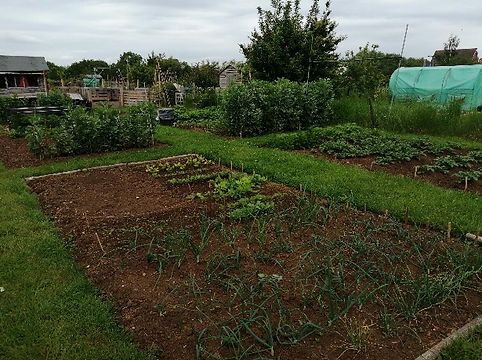
Equally, I enjoy chatting with other plot holders or hearing them quietly tending their plots at the same time. For me it provides just the right balance between community and solitude. One day a few years ago an elderly gentleman stopped to chat and then as the weeks went by and we got to know each other we discovered he had a plot next to Dad and knew him well. He would frequently stop to chat and we shared memories.
My youngest son has now discovered the joys of growing your own and has created a very productive space in what was a weed infested terraced garden on a steep slope. He asks for advice and I feel I am now passing the baton on.
My allotment connects me to my grandfather and father as it has brought many memories to the surface and now as my son has the bug it connects me to the future and a new generation learning the joy of growing your own. It is important to me for the peace I find when I am there, but above all else it is important for the memories it helps me hold onto and for the continuity between the generations it creates.

Gladys Blake, from Uppingham
Gladys Blake fondly recalls her father’s allotment in Market Harborough, memories that bring to mind both her parents, her service in the Land Army during the war, and the time she met her husband, Alan, who would later tend his own allotment at the Leicester Road site in Uppingham.
Recorded 2025
Uppingham


Dave Johnson: why having an allotment is important to me.
It’s not as though I’m a particularly good gardener! Most of the time, my allotment is several weekends away from being anything you could remotely call tidy. But somehow, it connects me to my past—even though no one in my family ever had an allotment. Not in the traditional British sense, anyway.
My father always loved gardening. One of my lasting memories is of him at the bottom of the garden, puffing on his pipe and quietly tending his crops. He had come to England from Jamaica during the war, travelling by boat as one of the early members of the Windrush generation. He joined the RAF and spent his entire working life in the services. So, it’s not one particular garden I picture when I think of him—we moved around every three years or so—but wherever we were, my mum grew flowers near the house, and Dad grew vegetables.

.jpg)
He wasn’t one to spend money. He saved seeds, even from tomatoes—perhaps a habit born of his humble beginnings. I was always amazed by how much he could grow in such a small patch of earth. He would have liked an allotment. The sense of camaraderie would have reminded him of life in the RAF. Sadly, glaucoma robbed him of that opportunity. Over time, he went completely blind.
.jpg)
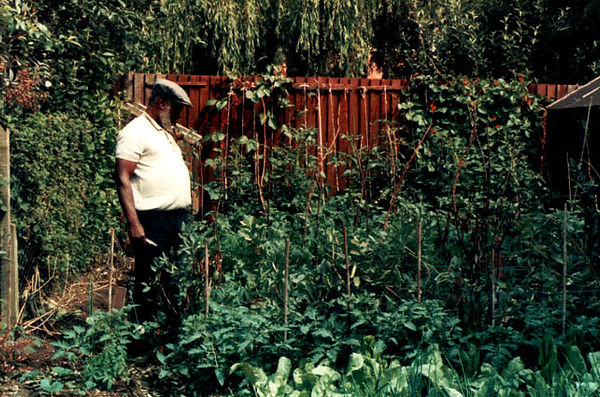.jpg)
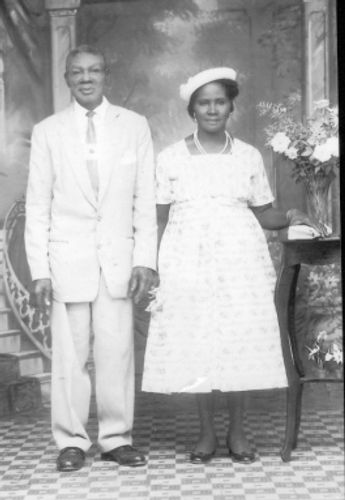
I always thought the love of growing things was in my blood. I never met my father’s parents, but there’s a black and white photograph of them in our family album. They’re standing in the hallway of what appears to be a grand house. My dad told me his father was a farmer, so as a boy, I imagined their land as a lush plantation—sugar cane, bananas, pineapples stretching across the Caribbean landscape.
It wasn’t until I was older that I realised the photo was taken in a studio. That mansion was just a painted backdrop. But still, the image of the plantation persisted: the descendants of slaves, now masters of their own land, of their own destiny.
.jpg)
That illusion changed in 2005, when we went to Jamaica for a family reunion. It was captured on the BBC programme Family Ties. There were about 200 of us from around the world, all related to my grandparents. My dad had passed away the year before, but my mum came with us. She was the heart of the documentary—it was her first time in Jamaica, too.
During our stay, we visited the village where my father had been born. No plantation—just a scrubby patch of land, maybe the size of an allotment, clinging to the steep side of a mountain. At the bottom was a small house built of concrete blocks which had replaced the home where my dad and his eight siblings were raised. Suddenly, it made sense. Of course he saved seeds! Money was tight. They were only a couple of generations away from slavery.

I had my first allotment long before that trip to Jamaica—back in the 1970s, when we lived in Liverpool. I remember opening the door to our first house and finding a milk bottle on the hallway table, filled with sweet peas left by the neighbour across the street. He grew them on his allotment. Once we’d finished renovating the house, I was more than happy to follow him there.
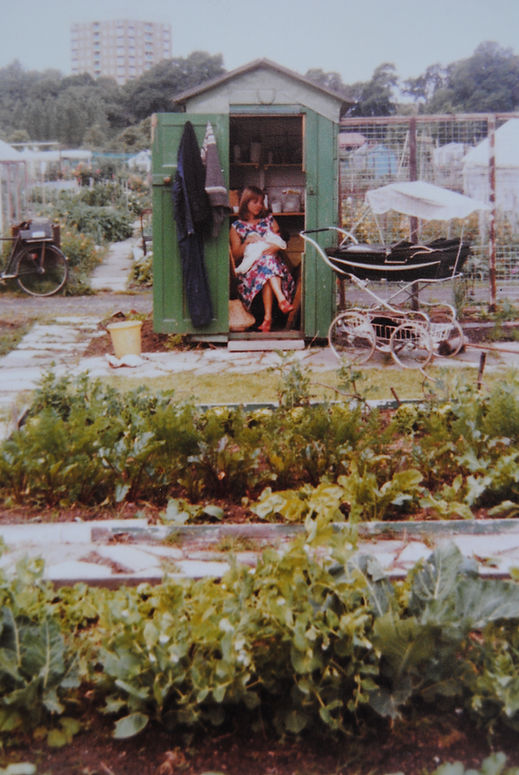
Back then, old pine doors were easy to find. They were pulling down Victorian terraces to make way for substandard housing, and those doors ended up lining building sites to keep the scallies out. Before long, people started stripping and restoring them, but for us, they became sheds. Two doors upright at one end, two doors longwise on top of each other down the sides, an opening door at the front, and a roof made of—yes you’ve guessed it—more doors covered in felt or corrugated iron. A thing of beauty.
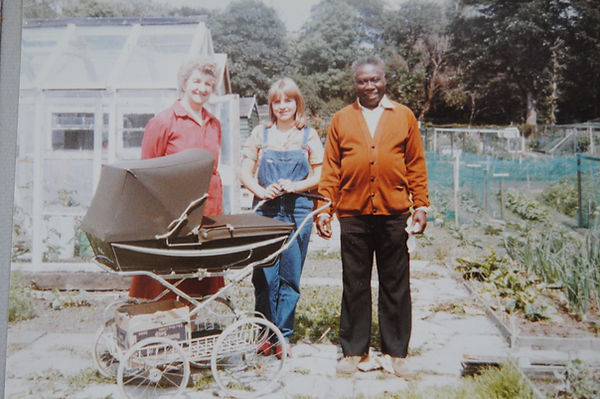_JPG.jpg)
My Mum, my wife, Sue and Dad (daughter, Elizabeth is in the pram)
We only had that plot a few years before we moved across the Mersey in search of a more genteel life (and more house renovations). What I remember most—besides my giant pumpkins—were the flourishing sugar snap peas. I don’t know what I was doing right, but I’ve never managed to grow crops like that again at my current allotment in Uppingham. The other thing I remember was that it was always several weekends away from anything you could remotely call tidy.
This is why having an allotment matters to me. Yes, there’s the unbeatable taste of freshly picked produce, and the quiet joy of being outdoors—surrounded by birdsong, under wide skies, watching a red kite wheel gracefully overhead. But more than all that, it’s the connection it gives me. To the land, to memory, to the hands that came before mine. What truly matters is the history it roots me to.




